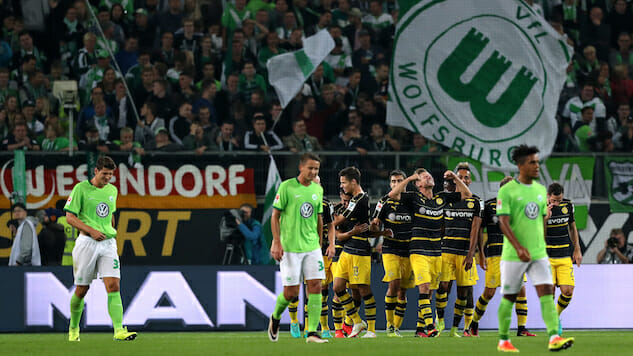Ahead of Bundesliga Restart, Wolfsburg Need to Reinvest Smartly or Risk Relegation
Photo by Ronny Hartman/Getty
In 2014-15, VfL Wolfsburg chased Bayern Munich for much of the season before succumbing and finishing second by a margin of 10 points.
Since then, they’ve enjoyed a transfer surplus of €61.65 million, and a shocking dip in form to go with it. Wolfsburg earned 69 points from 34 games that season; since then, Die Wölfe have won 51 points in 50 matches.
Prior to squeaking out victories against Eintracht Frankfurt and Borussia Mönchengladbach on the final two matchdays of the Hinrunde, Wolfsburg had just two wins in the first half of the season. At this stage a year ago, Wolfsburg were in fourth place. Now through 16 games, they’ve scored just 15 goals, 10 fewer than they did in as many matches last season.
That amounts to a major fall from glory for a club that reached the quarterfinal stage of the Champions League last March, and transfer dealings have been a big reason why.
Historically, Wolfsburg haven’t been afraid to drop serious coin on players. In the past two years (13-14 and 14-15), the club has run a transfer deficit of €73.55 million. While balancing the books is important, Wolfsburg are bankrolled by Volkswagen and will always have more money to spend than many of their Bundesliga rivals.
In 2008-09, when Wolfsburg won the league, they had a transfer deficit of €30 million. I looked at the transfer balance and league position for every Wolfsburg season dating back to 2000, observing an inverse relationship between a positive cash flow and a successful Bundesliga finish.

Wolfsburg need to spend to be successful and they have the money to do it. It sounds silly but it’s in the club’s DNA. Wolfsburg is, with a per capita GDP of €128,000 per year, the richest city in Germany.
Bankrolled by Volkswagen, VfL Wolfsburg is a daughter company of Volkswagen AG, in the same way Bayer 04 Leverkusen is wholly owned by Bayer AG. They’re not subject to the “50+1” fan ownership rule that most other German clubs must abide by, and a continuous cash flow provides the football club the funds necessary to ensure they club remains competitive.
Previously, the yearly amount was thought to be around €100 million. However, since the VW recall scandal, Bild have speculated that the club now receives €20-30m less per season from the automaker; a serious reduction in funds. Is this why they’re selling off players and not reinvesting the money properly?
In 2013, Welt.de speculated that without this money, Wolfsburg would face a relegation fight. From what we’ve seen this season, they may have been right.
-

-

-

-

-

-

-

-

-

-

-

-

-

-

-

-

-

-

-

-

-

-

-

-

-

-

-

-

-

-

-

-

-

-

-

-

-

-

-

-








































